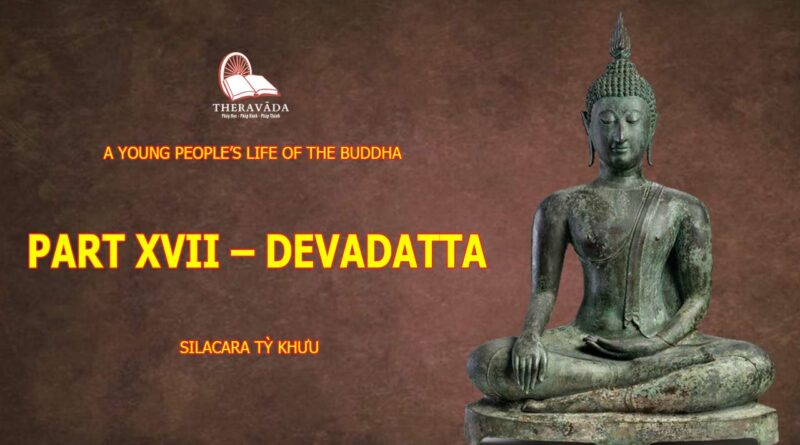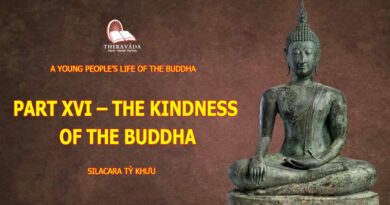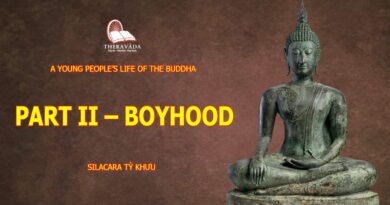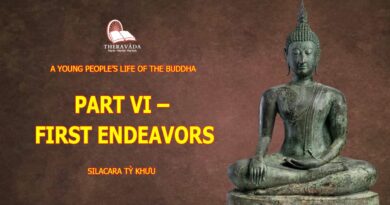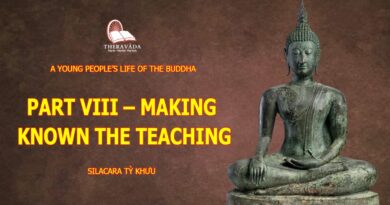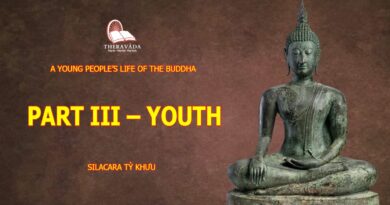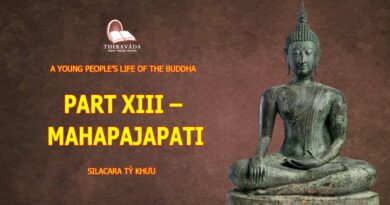A YOUNG PEOPLE’S LIFE OF THE BUDDHA: PART XVII – DEVADATTA
The Buddha had one disciple whom He particularly loved, and who in return, had a specially warm affection for his Master, and that was His own cousin Ananda. Indeed, when the Buddha had reached the age of fifty-one and was beginning to feel the burden of His advancing years, He chose Ananda to be His special private attendant, giving out through Ananda any orders He wished made known to the other Bhikkhus. The other Bhikkhus also, when they wished to see the Buddha about any special matter, always asked first through Ananda. And often, when there was something they wanted from the Buddha which they did feel very sure they would not get if they asked for it themselves, they used to get Ananda to ask it from the Buddha on their behalf, for they knew that He was fond of Ananda and would be more likely to do what they wanted if Ananda spoke in favor of it.
But the Buddha had another cousin who also had become a Bhikkhu under Him, but in his disposition towards is teacher and master, was the very opposite of Ananda. Far from taking delight in waiting upon the Buddha and serving Him faithfully, he was envious and jealous of Him, and wished to break up the Brotherhood of Bhikkhus He gathered round Him.
The evil-disposed cousin of the Buddha was Devadatta. Being of the royal family of Kapilavatthu, he was inclined to be proud of himself and of the royal blood in his veins. So when, some time after he had become a Bhikkhu, Sariputta and Moggallana joined the Order, and on account of their great learning and ability, every one began to take much notice of them and call them “the right and the left hand of the Buddha,” Devadatta became very jealous of them now, and annoyed and angry at the attention received by these two Bhikkhus who had not been in the Order as long as he, and were just of a common family while he was of royal blood and the Buddha’s cousin to boot. Indeed, Devadatta became so angry at what he considered the unjust neglect of himself in favor of these two new-comers, that he left the company of Bhikkhus who went with the Buddha everywhere He went, and set off for Rajagaha where he expected to make friends with the young Prince Ajatasattu the son of King Bimbisara of Magadha, and heir to the throne. When he got to Rajagaha he put on a look of great gravity and solemnity, so that young Prince Ajatasattu was quite struck with his appearance, and thought: “How serious and solemn he looks. This must be a very good Bhikkhu indeed!” And in his great admiration for the serious-looking Devadatta, he built for him a fine Vihara near the city, and Devadatta took up his residence there, and the Prince became his obedient and devoted supporter.
Time passed; and a few years after this, when, in the course of His continual wanderings, the Buddha came again to Rajagaha, Devadatta went to pay Him a visit, and asked to be allowed to form a company of Bhikkhus of his own, separate from those who accepted the Buddha as their Master. The Buddha, however, refused to give Devadatta the permission he asked for, saying that it was not a good thing for the Sangha to be divided. But Devadatta was bent upon having his own way, and he asked and asked again for permission to have a Sangha of his own, but each time the Buddha refused to grant him his wish.
Then Devadatta’s jealousy and envy turned to bitter hatred of the Buddha, and he made up his mind to start a Sangha of his own whether the Buddha gave him permission to do so or not. In this resolve of his he succeeded in getting Prince Ajatasattu to support him; but the Prince’s father, King Bimbisara, altogether refused to have anything to do with his plan for a new Sangha, and firmly took the side of the Buddha in the matter.
And now Devadatta, pretending to be very pious and strict in his life, worked his way completely into the confidence of Prince Ajatasattu, and gained such an influence over him that he was ready to do anything Devadatta told him to do. And when Devadatta saw that he could do anything he liked with Ajatasattu, he told him to put his father out of the way, and then he himself would be the King of Magadha and be able to do what he pleased with no one to hinder him, and he could help him, Devadatta, to carry out his scheme for a new Sangha. And Ajatasattu did what his evil counselor Devadatta thus advised him to do, but not suddenly with an arrow or a sword, for he still felt afraid to shed his father’s blood. Yet he did kill his father, and in a very cruel way. For he caused his father to be captured and shut up in a prison and given no food, so that King Bimbisara died a slow miserable death by starvation, in spite of all his grief-stricken wife did to try to get the jailers to take food to him. It was in the thirty-seventh year of the Buddha’s preaching career that Ajatasattu did this cruel deed, and took the throne of Magadha in the place of his father Bimbisara whom he thus murdered.
Devadatta now had all the power he wanted. The new king of the country was his devoted friend and supporter, and would do anything for him that he asked him to do. So, very soon, he got King Ajatasattu to gather together for him a band of bowmen and he paid them well to go where the Buddha was staying, and shoot the Buddha dead. But when these hired assassins came to the place where the Buddha was, and saw him sitting there so calm, so mild, and yet so majestic looking, they simply could not do what they had come to do, and had been well paid to do. Completely over-awed by the bearing and manner of the Great Teacher, instead of letting loose their arrows at Him, they came up to Him and sat down at His feet in an attitude of reverence and worship. And the Buddha began to talk to them; and after a little they confessed what they had come to do and asked Him to forgive them for their evil intention. Of course the Buddha pardoned them at once, and they promised to Him that they would be His followers for all the remainder of their lives.
But when Devadatta learned that the men he had sent out to kill the Buddha, instead of killing Him, had actually become His followers, he was furious with rage, and resolved next time not to send any one else but to go himself and take the Buddha’s life.
Now there was a hill near the palace where the Buddha was staying, and the Buddha used often to take a walk along a path at its foot. So one evening as the Buddha was taking a walk along this road, Devadatta who was all the time on the look out for a good chance to kill Him, without being seen by the Buddha climbed up the hill to a place just above the road, where there was a big rock. Devadatta loosened this rock from the soil round it, and waited till the Buddha was passing right below it. Then he gave the rock a big push and sent it rolling and bounding down the hill-side intending it to fall on the Buddha and crush Him to a jelly. But as the rock was rolling down straight for the Buddha’s head, it struck against another big one that happened to lie in its way, and instead of falling straight on the Buddha’s head, it broke into a lot of little pieces, and only one little splinter of it struck the Buddha on the foot and lamed Him for a little while. But it did not hurt Him very much, and He was able to walk back to the Vihara. And when He got there, the good and skillful physician Jivaka, put a bandage on it with some healing ointment, and by the next morning the foot was quite well again. So once more Devadatta was defeated in his evil designs.
But he was not yet finished with his endeavors to bring about the death of the Great Teacher. He was going to make one more attempt to get the Buddha out of the way so that he himself might be the leader whom the Bhikkhus would follow. For that was what he thought. He thought that if once the Buddha was dead, then he would become the leader of the Sangha, and all of the Bhikkhus would follow him as their master.
This time he arranged that when the Buddha went out as He did every morning through the streets of Rajagaha begging alms of food, a wild raging elephant should be let loose in the particular street where He was at the time, so that it might rush at Him and trample Him to death. And this was done. The raging elephant was brought to the street where the Buddha was then engaged in passing quietly from door to door begging His morning meal, and then let loose. But instead of rushing at the Buddha and crushing Him under its huge hoofs, it became quite quiet and subdued, and allowed the calm figure in the yellow robe to pass on unharmed. Thus for the third time the attempt of Devadatta to bring about the Buddha’s death was defeated.
Devadatta now gave up the idea of killing the Buddha, after failing these three times; but he was still as determined as ever, one way or another to bring about a break in the Sangha. So now he went to visit the Buddha, and pretending to be friendly with Him, told Him that he thought the Bhikkhus did not live strictly enough; he thought it would be better if they lived a harder life like the ascetic followers of other religious teachers, because the common people were inclined to look down on the Buddha’s Bhikkhus saying that they seemed to have rather an easy and comfortable life, compared with other ascetics.
Devadatta therefore suggested to the Buddha that He should make it a strict and fixed Vinaya rule that all His Bhikkhus henceforth should live no longer in any kind of roofed dwelling, but should sleep at night at the foot of a tree in the jungle, or in some open place without a roof. He also wanted the Buddha to order his Bhikkhus not to eat food specially prepared for them and brought to them in the place where they were staying, but to live strictly on such food as they got when round begging with their bowls, and to eat nothing else. Devadatta also wanted the Buddha to command the Bhikkhus not to wear any of the neat, clean, ready-made robes which the people used to give them, but only to cover their bodies with robes which they themselves had put together out of rags picked up on refuse-heaps and in tombs and burial places. And last he wanted the Buddha to make it a fixed rule that His Bhikkhus should not eat fish or meat of any kind. These four things Devadatta wished the Buddha to make binding rules of the Vinaya, which every member of His Sangha would have to observe or leave the Order.
The Buddha, however, flatly refused to make any one of these rules he suggested a binding command upon His Bhikkhus. “But,” the Buddha said, “if any Bhikkhu wishes to live always at the foot of trees or in places open to the sky, he can do so. But those who do not wish to do this, may live in places provided for them by benefactors, so long as they are not built too close to houses where the lay people live.” And the Buddha said the same about the other three rules proposed by Devadatta. He said that any of his Bhikkhus who wished to do so, could live solely on what was put into their begging bowl when they went through the streets for alms, wear only what robes they made for themselves out of dirty, cast-off rags, and abstain from eating fish and meat. But those who did not wish to observe such practices, need not do so unless they liked. And the Buddha ended by warning Devadatta that he must not try in this cunning way to cause a split in the Sangha, or in the end the consequences would be very had for him.
But, paying no heed to the Buddha’s warning, Devadatta went away disappointed and angry, and going to Ananda, tried to get him to side with his views about having a stricter rule for the Bhikkhus. But Ananda refused to agree with him and sided with his Master the Buddha.
Then Devadatta went away to a part of the country where the Bhikkhus had not seen the Buddha for a long time, and succeeded in winning over a lot of them to believe in him and in his new rules for the Sangha. But the Buddha came to hear of this. And one afternoon when Devadatta was asleep in his Vihara, He sent Sariputta to Devadatta’s place to speak to the Bhikkhus who had gone wrong and were following Devadatta, and tell them what the Buddha had really said on the matter. And Sariputta did as his Master told him, and spoke to the erring Bhikkhus so well that in a little while they said they wanted to be the Buddha’s disciples again; and they all rose up and followed Sariputta back to the Buddha’s Vihara.
When Devadatta woke again from his sleep that afternoon he thought the Vihara seemed strangely quiet as if there were nobody in it, and he went out to see what was the matter. And when he went out he found that there was not a single Bhikkhu about the place. And soon he learned that Sariputta had been there while he was sleeping, and had spoken to his Bhikkhus, so that now they had all left him, every one, and gone back to the Buddha. Then Devadatta was filled with rage and fury and ordered his servants to prepare his litter and take him at once to the Buddha’s Vihara; he was going to see what the Buddha meant by taking all his disciples from him.
But when Sariputta and the other Bhikkhus heard of Devadatta’s rage, and that he was on his way to the Buddha’s Vihara, they advised the Buddha to go away, for they feared that when Devadatta came, this time for sure he would kill the Buddha in his fury. But the Buddha was not in the least disturbed at the news that Devadatta was coming, and told Sariputta that he knew that Devadatta could not do Him any harm. “But he is full of anger at the Blessed One,” said Sariputta; and again he urged his Master to save Himself while there was time, for Devadatta was coming nearer. But the Buddha still refused to move saying again that He felt quite safe against anything Devadatta could do.
And the Buddha proved to be right. For the next thing the Bhikkhus heard was that Devadatta’s bearers had stopped on the way. Then came the news that Devadatta was dead. And it was quite true. Death struck down Devadatta himself at the very time, when he was on his way to bring death to the Buddha.
After this there was no more trouble in the Sangha as long as the Buddha was alive. The only distressing thing that happened in connection with the Buddha was that the king and the princes of the royal houses of Kapilavatthu and of Kosala, both were all killed in war by the cruel Ajatasattu, after once before having been saved from that fate by the efforts of the Buddha. This blotting out of the Buddha’s family happened in the year before that in which He Himself passed away into Nibbana.
Source: Budsas.net

